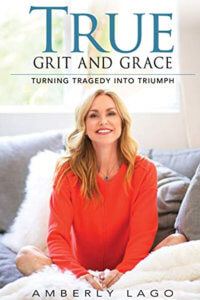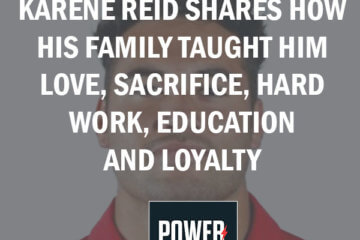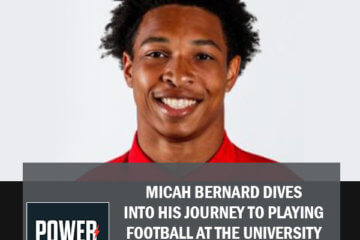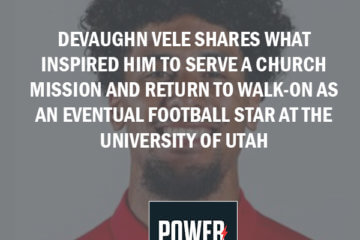Listen to the podcast here
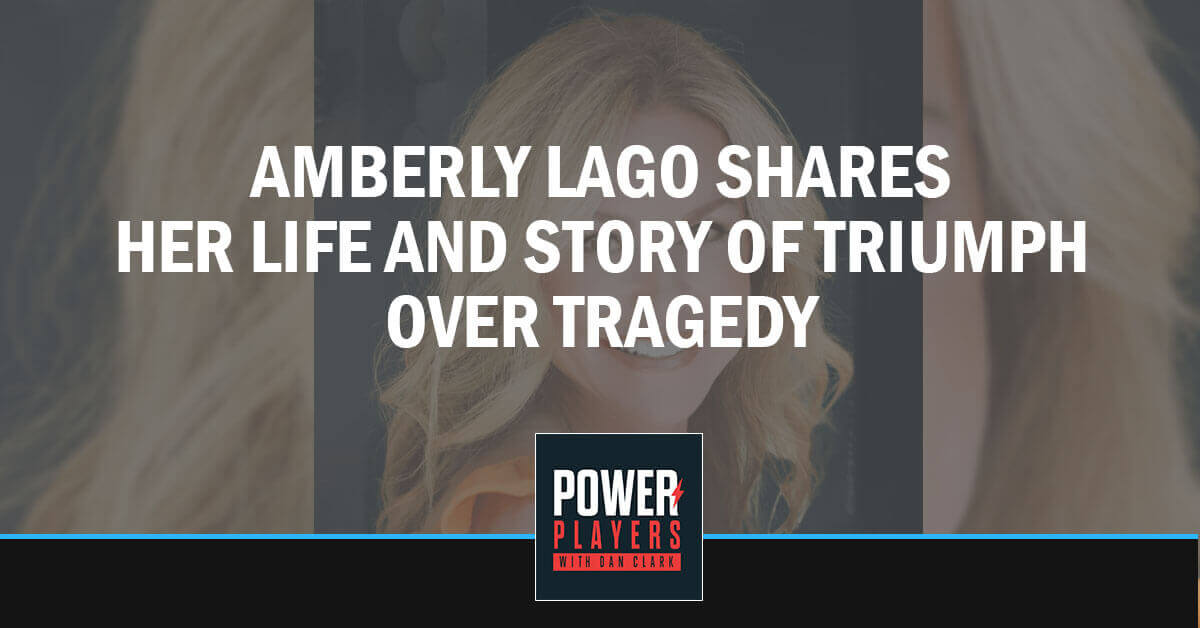
No matter where you are in life, there’s no amount of tragedy that can keep you down. Dan Clark warmly welcomes Amberly Lago, the renowned author of True Grit and Grace: Turning Tragedy into Triumph. Amberly shares her life and story of triumph over tragedy. She was abused as a child and eventually succeeded as a professional dancer and fitness guru, only to have her life shattered in a horrific motorcycle accident. Are you in a situation of despair at the moment? Things will be better, and you’ll get stronger. The key is to work on your resilience, positivity, and motivation every single day. So tune in for a dose of inspiration today!
—
Amberly Lago Shares Her Life And Story Of Triumph Over Tragedy
This is an interview with resiliency expert and global influencer Amberly Lago. In this episode, I have my dear friend Amberly Lago. She is a professional dancer, athlete and expert in the fields of transformation, health, wellness and recovery. She’s also the bestselling author of True Grit and Grace and host of her fiercely popular podcast by the same name.
She shares her life and story of triumph over tragedy, being abused as a child and eventually succeeding as a professional dancer, model and fitness guru, only to have her life shattered in a horrific motorcycle accident. She’s giving us an inside glimpse into the mind and heart of someone who with faith and tenacity has become one of the top 1% podcasters in the world and an in-demand inspirational speaker.
—
In this episode, you’ve got to pull out a pad and paper, hook on your seatbelt, kick off your shoes and make sure you’re comfortable and ready to connect your head with your heart because our guest is one of my favorite human beings on the planet. It’s crazy how there are billions of people on this Mother Earth. As a professional speaker/entertainer, I interact with over six million people.
My audience has 6,000 speeches in 73 countries and yet, there are only those select individuals that you connect with in a perfect chemistry way that are instantaneous friends that become lifelong friends. We’re talking to one of my dear friends. If you added up the number of minutes that we’ve spent together, shoulder to shoulder in the same room laughing and crying, it hasn’t been probably more than three days. It’s counting our experience at the giant mastermind that Greg Reid, our dear friend, hosted in San Diego.
Amberly Lago is Portuguese for awesome women. In a snapshot, she is a leading expert in the field of resilience, transformation and health and wellness. Here’s why she’s the bestselling author of her bestselling book, True Grit and Grace. If you itemize each one of those words, true is authenticity. Grit is that tenacity to get back up and go again. It’s living life with the social graces of please and thank you, sophisticated elegance and polished professionalism.
Whoever coached her in coming up with the title of her podcast and the bestselling book was inspired by the Divine. Amberly empowers people around the world by sharing her story of how she turned a tragedy into triumph. She’s a former professional dancer. My wife and daughters relate to her and her story so well. She’s an athlete who’s bringing a new perspective on what it takes to truly persevere. Ladies and gentlemen, please welcome to this episode a dear friend, a fast friend but an extraordinary human being. Amberly Lago, you graced me with your presence.
Dan, I love you. That is the best introduction I have ever had. I want to hang out with you all the time. I’m so grateful to be here, especially on your show. I am so honored. I followed your show. You’ve had some of my favorite people on your show like our friend, Amy Purdy and so many amazing people. I am truly honored to be here and get to talk with you so thank you for having me.
Thank you for having me on your podcast. That was an honor.
I have to tell you this. Your episode is the most downloaded episode of True Grit and Grace yet. I’m not kidding you, I had to share that with you.
Thanks. Way to get me crying at the beginning of our interview. When you have a chance to meet someone who’s a mentor like Amberly who to me is a hero in so many ways and inspiration at so many levels, with my twisted sense of humor, I should have awakened earlier, put on some makeup and curled my hair. I’d go to the gym and lost 13 pounds and got liposuction in my tummy or maybe a facelift to be in an appropriate mood for this interview but I decided to tap into my son-in-law’s company’s mantra, “8760 is the hat and the matching shirt.”
When you have to work twice as hard, you learn grit.
It reminds us of the number of hours in a year. Every single time I interact with you and hear you speak, you remind us that no matter what your past has been, you have a spotless future. You’re the most in the present moment person I’ve ever been around where you meet thousands of people during your speaking and engagements.
At that moment, no matter how many people are in line to greet you, thank you and buy your book, you only have eyes for the person in front of you. That’s more than talent. That’s so extraordinary so I decided to wear a ballcap instead of coming out with my hairdo. I wanted to say to the audience that in case you see my tooth missing, I was speaking in San Diego and prior to my speech, I had crunched something in my mouth and it hurt.
My tooth fell out in the middle of my speech so I raced home and went to the dentist. He extracted my tooth and did a bone graft. My tooth is missing and I’ve been on the program so many times with people who would say, “I can’t do it. My tooth fell out. I can’t go on stage, be in front of a camera or do a photoshoot. I’m going to cancel everything.”
I volunteered at the Primary Children’s Hospital at the University of Utah campus two days a week and I remember the first time I went. I had broken my neck, back and knees. I had seven surgeries on different knees and was in so much pain. I was walking up and down the stairs, refusing to take the elevator and finally, I complained. I was leaning over and said to my wife, “My back hurts so bad. I have the biggest knot. My knees are killing me. This is so bad.”
We go into the theater for this little fellowshipping meeting. These mothers and fathers are bringing their sick children. There’s this little thirteen-year-old who was pushing her IV tower. She had a bald head which she lost through chemotherapy and radiation treatment. I started to weep and realized that I have no right to ever complain again. Regardless of how goofy I might look with a tooth missing, I wanted to make a point.
As we dive into your life, pre-injury and post-injury, people need to understand that true grit and grace are so much more than a beautiful soul with a smile on a book. You embody resilience and perseverance with grit and grace. That was a long introduction before I even asked you the first question.
People need to understand that when you’re around Amberly Lago, you leave saying, “I like me best when I’m with you. I want to see you again.” You can never make an excuse for anything as you take the stage usually dancing and generating so much energy in the room. You’re usually in a beautiful high fashion skirt, unashamedly exposing the scar on your leg from this horrific motorcycle accident which says, “Big deal. Here we go. Strap it on.” If you ever feel sorry for yourself again, I will reach over there and slap you with your southern drawl.
This is way too much of me. Amberly, take us into your childhood and how you grew up. I want to know at what point in your life you realize you had true grit and grace because adversity is what introduces us to ourselves. No one will ever know how strong we are until being strong is our only choice. Take us back as far as you want. Hopefully, you can take a moment to identify when you believe that you learned resiliency and the significance of persevering. Ladies and gentlemen, Amberly Lago.
Dan, first of all, you’re my favorite speaker in the world. I always say that because it’s true. I could listen to you all day, especially when you’re talking about me. You and I grew up a lot alike. We were both athletes. I don’t know how you grew up. We didn’t have a lot of money. My mom had 5 kids and worked 2 jobs. If we wanted something, we had to work for it. I started working at the age of eight, babysitting.
At the age of thirteen, I was teaching dance. By the time I was in high school, I was a lifeguard and scrubbing toilets. I had a job at a little cookie store and teaching dance full-time. I would get out of school early so I could go to the dance studio. I had these big dreams. I come from this small town and grew up in a not-so-safe home. There was sexual abuse from my stepfather.
My older brother, we’re friends now but he used to use me as a punching bag. He apologizes since but it was not the shoving and horsing around. It’s the kind where he would punch me in the face with his fist. He’s 6’4”. I grew up having to fend for myself and be tough. I was in survival mode. From a very young age, I was like, “I am getting the heck out of dodge. This is not safe.” I was going to LA to be a professional dancer. Some people would have been scared to go to LA to try to become professional dancers. I was like, “Pain pushes you and vision pulls you.”
The pain of being home was like, “This is not safe. It’s crazy here.” My vision pulled me. I saved up $1,200, moved to LA and said, “Ignorance is bliss.” I had no idea that I was not a very good dancer. I was for the small town that I was in but when I got to LA, I had saved up enough money to take dance classes for a month before there was a big audition for a scholarship. It was my goal to try to get a scholarship at this dance studio. I made straight A’s. I was a go-getter and an overachiever.
That was my default for escaping the pain, abuse and stuff like that at home. I spent my time involved in school getting straight A’s. Although I had this partial scholarship to UCLA, that was never my plan A. That was maybe on the back burner but I wanted this dance scholarship. Lo and behold, they took pity on me. I was the worst one but they let me on scholarship. I was the worst so I had to take the most dance classes and was required to take the most ballet classes than any other person on scholarship.
Being an athlete taught me grit. I was running track in eighth grade with my coach yelling at me, “Get off the track if you’re going to throw up and keep running.” My dance teacher was like, “I don’t care if your toes are bleeding. The show must go on. Do you want your understudy to take the job? You need to push through the pain.” Moving to LA and becoming a dancer was like, “I’m not as good as the rest so I’m going to have to work twice as hard.” That’s where I learned grit.
Within the first two weeks, I got to LA. I had 4 jobs, 2 waitressing jobs and 2 jobs teaching at 2 different dance studios. I didn’t have parents that were like, “Let us take you to LA and find you a cute little apartment. We’ll buy some furniture, take you to IKEA and get you some towels.” It was like, “Good luck.”
My stepmom was like, “You’re making a big mistake.” I didn’t have a lot of support. I had a lot of doubters but I believed in my vision. I knew that if I worked hard enough, did it with kindness, kept the focus on where I wanted to go, what I wanted to do and did everything I could to get there, eventually, my dreams would come true.
I got an agent. My first dance gig was with MC Hammer, U Can’t Touch This. I got to travel the world. I used to go to Japan twice a year on tour with a company. Dan, I thought, “I get paid to do what I love.” It surprises people sometimes when I get out on stage and they don’t know that I used to be a dancer and I start doing some crazy dance moves. They’re like, “What’s that old lady doing up there?”
Let me reflect on an experience. I had a dear friend who’s 6’6” and an all-American basketball player and I was an all-American football player. He was an African-American. We’d go out as salt and pepper, the two seasoned vets as professional speakers. He asked me to listen to his speech one day and give him some evaluation back in the early days when we became friends and professional colleagues.
He had a speech impediment. He stuttered badly. On this first day of kindergarten, he left school early and ran all the way home. He jumped right into playing basketball, got a scholarship and then he’s this Hall of Fame professional speaker. He asked me, “Clark, give me some feedback.” I said, “You left out so much information. What did your mom say to you when you ran home from kindergarten early? What did you do in your life to overcome this speech impediment? What is your rebound rate?”
We all have arguments with our spouses and significant others. How fast can you put your pride in your pocket, have a heart-to-heart communication and a talk? I’m taking you deeper. When you’re getting beat up by your brother and there’s so much of a feeling of unsafe, how did you keep getting back up and going again?
You don’t have to walk around feeling shame; you can hold your head high with dignity and grace.
Grit is tenacity when you don’t have that support from others. I’m asking you this deeper question to try and connect the dots of the steps of resiliency. How do you get back up and go again? I was a boxer. If somebody punches me in the face and I go down, I’ve got to get back up and go again because that’s the culture. You didn’t have a cutback culture. Teach us all. What allowed you to keep getting back up and going again?
Sometimes when you’re going through a crappy experience, a hard challenge, adversity, trauma or physically and sexually abused, which I don’t wish upon anyone, you can’t say that there’s any good in it. Looking back at a lot of those moments, there were some blessings in those moments. In getting beat up, I learned, number one, no one was going to rescue me. I had to rescue myself and show it to myself. I would try to fight as hard as I could. I would always get back up.
I remember running towards my brother with arms flailing ready to kick his butt. He would just giggle. He’d pick me up and throw me across the room. I would hit the wall, go sliding down and I would get up and run towards him again. There were times when he busted me in the mouth and I had braces on. There was blood everywhere and my response was, “I’m going to tell mom.” He thought maybe he would get in trouble but my mom was busy with work. My dad wasn’t around. My parents did the best they could with what they had.
I learned to take care of myself. I took boxing classes. When I got older, I took Krav Maga. I’ve got a belt in Krav Maga. I did Muay Thai. I started going to the gym and getting stronger. I thought about what I could do because I was so small. This might sound cheesy but I did what made me feel good and happy. There was so much pain and it felt so unsafe at home. It’s so important for kids to have an outlet and luckily, my outlet was athletics and dance. I became the fastest runner in track. I set a state record in Texas, which has long been broken since I’m sure but back then it was a big deal.
I became the fastest runner, good at sports and the best dancer at my studio. Looking back, maybe that’s what I could do that was good. It made me feel good but it also was safe for me. It wasn’t safe being at home. Being at the dance studio and school was safe. I did what I could and I always think how in those moments, I did reach out for help. It took a lot of courage.
Go into the sexual abuse part, that took a lot of courage. When you’re sexually abused, usually, the abuser makes you feel like it’s your fault. You’re bad, the one to blame, dirty, worthless and all the worst feelings of shame. My stepdad told me that he would kill my mom if I told her or anyone. I believed him. I was eight years old.
It went on and on and finally got to the point where as a little kid, I was thinking, “I can’t live this.” I went and told my dad. I said, “Dad, you can’t tell anybody.” I remember how that took so much courage. He didn’t do anything about it. Even that was a blessing. Dan, I know what kind of dad you are. You’re an incredible dad. My dad is good. That was probably the hardest thing to write about in my book because I wasn’t writing about that to make my dad or my mom look bad or anything like that.
I wrote about it so that people will know that you don’t have to walk around feeling shame. You can hold your head up high with dignity and grace. You can still go on to have a joyful, abundant life with a loving husband and children. You can break those abusive cycles. It was hard to write about but it did heal my relationship with my dad.
At that moment when he didn’t do anything, it was a gift to me because it taught me that I’m going to have to take care of myself and get stronger. The next time that my stepdad came into my room, I kicked him, hit him and punched him as hard as I could. With that look on his face, that was the last time he ever touched me again.
What little town did you grow up in Texas?
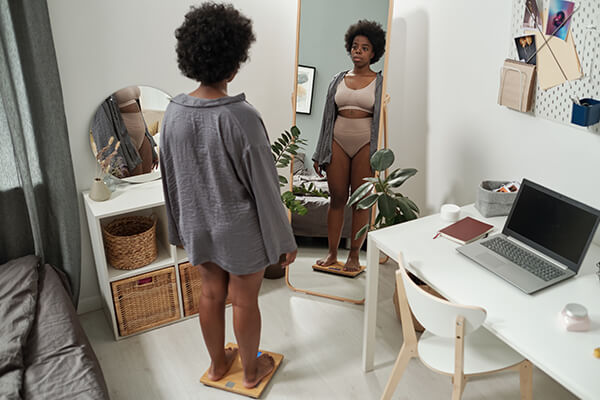
Triumph Over Tragedy: It’s crazy to look down at your body and see it completely deformed.
Greenville, Texas. It’s pretty wild. I moved back to Texas about 30 minutes from the town where I grew up in. I couldn’t quite move back to that town.
How many people were there when you grew up?
There were about 12,000. There’s a lot more now. The town I’m in has 7,400, which is crazy.
The point is, it’s not the size of the dog in the fight. What matters is the size of the fight inside that dog. It’s not about the size of the town. It’s about the size of the dream, escaping, controlling what you can control and not worrying about what you cannot control and being your own person. It’s the rebound rate that nobody’s there to rescue you. I love that.
Take us to LA from making your dreams come true out on the World Tour doing your dance thing and throwing some modeling in there because in LA there are a lot of crazy folks but they’re not blind. You’re doing that as well. Take us from where you left us off to what your life was like when you decided that you were going to be a Harley chick and get yourself a motorcycle.
I have always loved motorcycles. I grew up on dirt bikes. I remember when I was dancing part-time. I’d have extra work for extra money on movies and stuff like that. I met this one producer and he was roommates with Dean Cain who used to play Superman. He invited me to go motorcycle riding. I was like, “Yeah, but I don’t want to ride on the back of a bike. I want to ride my bike.” He goes, “Whatever.”
I had my class M1 license and then went and bought a motorcycle. They were surprised when I showed up at their house next time ready to ride but with my bike. We rode together. I started getting into fitness and working full-time. When I had my first daughter, I didn’t ride motorcycles as much because I was like, “That’s too dangerous. I’m a mom.” It’s funny because when my husband and I got married, he was a chippie with the Highway Patrol, a Lieutenant Commander but when I met him, he was a Sergeant and head of the chippies.
What’s a chippie?
Have you ever watched CHiPs?
Of course, I have a great picture with 1 of the 2 guys. It’s for our readers.
Things will be better, and you’ll get stronger.
He was California Highway Patrol. When I first met him, he was on a Texas chopper. I was like, “He’s riding the Texas chopper. I’ll go out with him.” I ended up getting another motorcycle and we used to ride. That’s what we did for fun but I was thinking, “I’d gone through a couple of failed marriages. I had lived through a lot of injuries and stuff in the dance industry.” The dance industry is pretty tough and cutthroat but I loved and enjoyed it. I knew I wanted to retire from that at a young age.
I had this idea that at 25, I’m going to retire from being a dancer and do my next thing. That’s when I got into the fitness industry. I had a successful career in the fitness industry. I was doing infomercials, fitness videos and Shape Magazine. It was crazy. I would go into Rite Aid or CVS and see my picture on vitamin labels and stuff like that. I was at the height of my career. I was saying, “I finally made it. Life is good. I’ve got a good husband and two healthy daughters.” That’s when everything changed in the blink of an eye when I had my motorcycle accident.
Take us through that day to what you were doing and what happened when you got hit.
That day was a holiday weekend and it was a Friday. I ran at my best time. For the first time, I beat my workout partner. He was so competitive and I was like, “Yes. I ran 11 miles and I beat him.” I had trained clients and was feeling good. I jumped on my motorcycle. One of my friends was walking out and she said, “Be careful.” I’m like, “I will.” I got on and I remember taking a long way home. I was like, “I want to feel the wind through my hair and the sunshine on my face a little bit longer. I’m going to take a little bit longer way home.”
When you’re on a motorcycle, you drive very defensively so you’re constantly looking to make sure other people see you. I looked and was like, “That guy sees me.” I then was like, “He doesn’t see me. I don’t know.” He made a left and it wasn’t like he scooted out. He punched it out and all I could do was let go of the clutch and try to jump off my bike but it was too late.
He T-boned me. I was thrown about 30 feet sliding across the asphalt. All I can think is, “Please don’t let another car hit me.” I couldn’t tell what I was sliding into. I was on a busy street on Ventura Boulevard. When I finally came to a stop, I looked down at my leg and it was crumbled into pieces. It’s crazy to look down at your body and see it deformed. My foot was off of my leg. There was blood everywhere. I didn’t know it at the time but my femoral artery was severed.
I wish I knew who this guy was. I don’t know who he is still but he was a guardian angel I swear because he came over right away. He ripped off his belt and made a tourniquet on my leg. He saved my life. He saved me from bleeding out. Talk about everything being at exactly the right timing at the place at the right time. The paramedics were already running to me. They saw and heard it happening before they even got the call.
The guys were running with their bags before the fire truck could even turn around from the little Coffee Bean store and get to me. I was only about five minutes from home. My husband drove on the wrong side of the road. He was home waiting for me to get home to get to me so he got there quickly. I knew it was serious but I had no idea how serious it was.
When I got in the back of the ambulance, I thought, “I might be dying.” The pain was nothing like I’d ever felt but I was squeezing the paramedic’s leg trying to get some eye contact or reaction. “Am I okay? Are we good? Am I going to make it?” He wouldn’t look at me. I thought, “This is so bad that he’s not even looking at me.” They start trying to cut my jacket off. It was a brand new hot pink Lululemon jacket. I’m like, “No. Don’t cut that off. This is new. I can slip this thing off.”
I’m sure they are probably looking at me like, “This chick is crazy. She’s dying but worried about her jacket.” They start putting an IV and I’m like, “Hold up. What are you giving me in that IV?” They’re like, “Morphine.” I said, “You can’t give me morphine because I’m allergic. I’ll go into anaphylactic shock.” They’re like, “That’s all we have.” I was, at that point, thinking, “Maybe I do want to go into anaphylactic shock because this is way too painful.”

Triumph Over Tragedy: We create habits, and then habits create us.
I got to the hospital. The brotherhood and sisterhood of the police force are like family so one person goes down and everybody knows about it. The ER was filled with cops. It was chaotic. My husband is a big tough guy. I had never seen him cry. He was hysterical running back and forth. I’m taped to the gurney and I can only hear this loud wailing.
I yelled across the room, “Johnny, I need you to get over here and be strong for me.” At that moment, I didn’t know if I was going to wake up or if I was dying. I wanted to know that he was going to be able to take care of our kids. He came over and held my hand. That’s the last thing I remember before they put me in an induced coma.
I wish we could flash a picture up on the screen for everyone to see but you’ve painted a word picture. It’s an unbelievable accident. Take us from when you came out of your first surgery. How many total surgeries did you have? Give us the details of the plastic surgery, the grafts or whatever they had to do to give you the strength for you to continually dance and fill every room, aisle and space with joy and happiness? You wouldn’t notice that you even had surgery or an injury unless you wear one of your famous skirts that showcases your story.
I’m chuckling because I did this Facebook post and I saw a comment on it. I was in a dress. Everybody had commented on it and mostly it was people who know me but there was a young guy who didn’t know me and he commented on it there, “Did anybody notice her calf?” He made this crazy-looking grossed-out face.
It made me chuckle when I wrote back, “I sure hope so because it only took 34 surgeries to make it look that good.” I woke up from a coma and the first thing I learned was, “You’ve got a 1% chance of saving your leg.” My first thought was, “There’s still a chance.” It’s like dumb and dumber. It took an act of God to get me transferred to a different hospital to find a doctor that was willing to take that chance with me.
I had an amazing bunch of doctors. Dr. Weiss is retired but I used to threaten him like, “You better not retire, because if I need you, I’m going to go find you on that fishing boat and hunt you down.” I had an amazing team of doctors. Surgery after surgery, 34 in total and months in the hospital, I went from being this elite athlete to being covered in bedsores and losing 20 pounds of muscle when I was already at 12% body fat. I looked like I had been through a war.
They took the skin from my upper leg and did skin grafts to put it on my lower leg. They did a skin graft and muscle flap. They moved my calf to the front part of my leg. I was self-conscious of my big calves. As a belly dancer, I had big calves. I was so grateful that I had big calves because the doctor was like, “We’re going to have to do a muscle graft. We’re going to try to use your calf. If it’s not big enough, we’re going to have to use a muscle from your back.”
My thought was, “That calf has got to be big enough. I’ve got some big ole cows down there. Don’t touch my back. Use that calf.” It was a journey. Thirty-four surgeries were hard but when I learned about resilience and grit, as a result of the accident, I was diagnosed with complex regional pain syndrome, which is dubbed the suicide disease.
I thought that things are going to get better and I’m going to get stronger. I’m going to be able to run again, get back to my life as a trainer and all these things. Even though I hadn’t fully set in the way that I looked and how my leg is deformed, my ankles fused and its metal from my toes all the way up, being diagnosed with CRPS was when I felt I got kicked in the gut.
To be told, “You’re never going to get better. You need to go get back in your wheelchair. Your life will never be the same. You’re going to be permanently disabled. You’ll never work again. You’ll probably have to wear orthopedic shoes.” I was like, “First of all, I am never wearing orthopedic shoes.” I’m kidding. I do wear them sometimes.
Pain is an indicator to ask ourselves the question, “what do we need to learn to grow?”
I was like, “That can’t be my life.” I went from denial to hitting rock bottom and through sheer desperation forced into acceptance before I could start on this healing journey and transformation. I did a lot of soul searching, connecting to my higher power, building my resilience, grit more and learning how to give myself grace. I was so hard on myself. I got to go and push through the pain.
I had to learn to listen to my body, heart and intuition so it’s been quite the journey. A lot of people can relate because pain is pain. We all have pain whether it’s chronic pain, physical pain or emotional pain. Pain demands to be heard. Pain is an indicator. It doesn’t mean that we have to stop doing what we love or suffer. It is an indicator to ask ourselves the question, “What do we need to learn? How do we need to grow? What do we need to do next?” It’s not, “Why me,” but what’s next?
You remind me of classic lines that I’ve used or coined for years. In medicine, prescription before diagnosis is malpractice. We’ve been trained to ask the right questions to get better answers. To your point, usually, we only go into a doctor’s office when we’re in pain instead of finding the prevention side of nutrition, health and whatever else we can do to prevent it. Through the question and answering session, sometimes they don’t ask the right question. My point is that we have to scratch where it itches. Every time I’m around you, you remind me of these prolific answers that simplify our resilience and desire to persevere.
Here’s a classic example. I remember when I blew up my knee, “Be a big boy. Don’t cry. Be tough.” I toughed it out until the limp became so brutal and painful that it created back pain. Finally, when the back pain got so excruciating, I broke down and went to a back doctor. He couldn’t fix anything because it was not a back injury. It was a knee injury. We have to go where that pain is and scratch where the itch is.
The other thing you always remind me about is every time I’ve been injured, which I’ve broken my neck and back, had my head sewed up eleven times and two hernias, if I went through the complete process of rehabilitation, every single part of my body that was injured became stronger than it was before I injured it.
That also applies to our hearts, shattered dreams, broken hearts and emotional stability. You are the epitome of grace and grit, your attitude of gratitude. Take us into how you’re able to isolate different parts of your life that happened to engage in pain at that moment. In other words, physical but how about mental, confidence, spiritual, emotional stability and family?
You are complete and yet if we can’t compartmentalize our pain and lives, we wake up and think the whole sky is falling. It’s like the chicken, “The sky is falling. My life sucks.” You say, “No, it doesn’t.” Let’s itemize what part of your life is forcing you to struggle at the moment and then scratch where it itches. I got that from your 60-minute keynote.
Regardless of what’s going on in your life, in your words, you said, “You can stop, pause, fix, scratch where it itches and move on to the next point.” Take us to that mindset. You’re such an expert in this. I’m trying to milk it out for everybody else because sometimes in 60 minutes, you have to skate over the top of all these deeper answers and formulas but I know they’re in there. Teach us.
It was at the point where I was out of work for a year and a half and I was the main breadwinner.
How old were you when you had your accident? How long did 34 surgeries take you?

Triumph Over Tragedy: You have to work on your resilience, positivity, and motivation every day.
I was 38. It’s almost 6 years but for the first 2 years, I was in and out of the hospital the most. I had $2.9 million worth of medical expenses. We had a lien on our house. My husband was trying to hold it together. He was working. We had a two-year-old and a teenager. I am looking down at myself with disgust. I hate the way I look, myself and the pain that my leg gives me. I am becoming this bitter and not grateful person.
I started creating habits that did not serve me. We create these habits and then these habits create us. This habit that I had created was not very pretty. I couldn’t get out of the pain. I was trying all these different things. I was doing ketamine infusions that were $2,000 a pop at UCLA. I had Eastern-Western medicine, spinal stimulator and spinal radiofrequency which go in and burn the nerves in your spine. The first doctor didn’t tell me that that could cause me to go paralyzed but I was desperate to get out of pain.
Anything that said, “This will get you out of pain,” or this person would say, “I can get you out of pain,” I was like, “Okay. What do I need to do?” Nothing was working so I started drinking. I thought, “This wine helps.” I was never a drinker. I was one of those people who while college kids were partying, I was the bartender collecting their tips. All of a sudden, I was drinking every day. I thought, “This isn’t the healthiest thing but it is what I have to do to get through the pain so I’ll have to do it.”
I spiraled down quickly. I became addicted to drinking and that has been a gift because it forced me into a place where I had a choice. I was at a point where I was thinking, “I don’t want to live anymore but I’m too scared to die and take my life. My husband can find a better wife. He could find someone to take care of the kids. There’s got to be more to life than this.”
That’s when I got on my knees and prayed. I said, “Please help me.” At that moment, it allowed me enough courage to ask one of the former clients that I knew had a problem that she had cured with a Twelve-Step recovery program. She had been in this program and stopped drinking. I thought, “I need to call her.” I called her and she said, “I’ll get you some help.” I didn’t hear back from her and I thought, “I’m going to die. I need help.”
I googled Twelve-Step recovery. I found a meeting where my husband would be at work and my daughter would be in school. I went from sneaking drinking to sneaking going to recovery meetings. In the first meeting, I walked in scared to death. I had tremors. I was so scared. I sat on my hands because I didn’t want anybody to see me shaking. I sat in between a nun and a cowgirl.
I thought, “What kind of a place is this?” All of a sudden, people started to share and these women shared these stories. I felt like, “I’m not alone. They understand me. She’s telling part of my story.” I heard hope. Slowly but surely, day by day, I started to get my spiritual connection back to my higher power who I call God. I started to develop my emotional resilience a little bit more through journaling and therapy.
I started to read books, listen to podcasts and go to the gym. Even when I was in pain, I would work out my upper body instead of doing things on my leg if my leg hurt too bad. I have been trying to work out a lot. I was in the gym in my wheelchair. I had dumbbells in the hospital. I had a pull-bar over the hospital bed. When I’ve gotten so bad and deep in despair, I was not even able to work out. Slowly but surely my physical, mental, emotional and spiritual resilience was starting to rebuild but it wasn’t like, “I have it and I’m all better.”
This is something that I work on every single day. A lot of people think I’m positive or super motivated. I’m not. There are days that I sit in the car in the parking lot looking at the gym and I’m like, “I’ve got to go in there but it’d be so much easier to scroll through Instagram.” Then I’m like, “No, Amberly.” I think about my why. When I work out, I have more confidence. It makes me feel better mentally. It releases endorphins that combat pain. You know all of this because of being an athlete.
There were so many times when I couldn’t go and work out, walk on my own or drive to the gym. The minute I ever have a thought like that, I go, “I get to go do those things.” For me, resilience isn’t just about physical or one singular thing. It’s transformation. It takes over your whole life, your mind, body and spirit.
Small decisions that you make every single day end up changing the rest of your life.
I have non-negotiables, which is every morning I have some me-time with God, my journal, writing and reading. I wake up before everyone else so I can have my time and get the day started. I also have my family time and my time with my daughter at night. We have our gratitude practice together every night before she goes to bed. It’s these little small decisions that you make every single day that can end up changing the rest of your life. It’s the little perspective shifts that you make every single day that give you a different outlook on life. It isn’t our circumstances that define us. It’s our resiliency that defines who we are.
You’re a wise woman. It’s like Mother Teresa embodied in Cindy Crawford. I need to write your bio better. Eight thousand seven hundred sixty hours in every single year. Let’s wind up. I’ve been thumbing through your book. Every page is a mirror because it allows us to pause and say, “How does this relate to me?” It’s well written. You’re powerful.
How do people get a hold of you? How do they know where you are because you are one of the more active speakers, not just a podcaster? You’re so busy. We have let down that mask mandate and the vaccination that never worked so we’re back together belly-to-belly in these social environments. How can we track you and join your tribe?
I would love to give your amazing audience a gift. I have a downloadable playbook because I want people to be able to get some tangible tools that they can take with them. It’s my five-part pace method that teaches you to tap into your superpower resilience because we all have it. If you text me the word GRIT to (818) 214-7378, you can get that free playbook. It’s also me texting you back. Say hello and reach out. I’d love to connect with you. Tell me you’re a friend of Dan and I’ll throw in an extra surprise.
I’ve stolen so many towels over the years from Ritz-Carlton and Marriott. Maybe I could send them down to Texas and you could start giving those away because they’ve been important to me in my career. I’ll bag you some soap and shampoo. I could team up with you. This is going well.
You can find me at AmberlyLago.com and hang out. All the shenanigans and any behind the scenes are on @AmberlyLagoMotivation on Instagram. Take a screenshot of Dan’s show and tag us because I want to see it and I’ll share it in my story.
Do that for sure. I need to do that.
You are so awesome. I love you.
I can’t wait to see you again in the program. I always look forward to seeing you. Being in your presence, you lift everyone. Let me remind the world that as a professional speaker, men can be role models to men but women like Amberly Lago could be role models to both men and women. You can get men to do other things that men can’t get us to do.
I appreciate your friendship, example, presence and being present in every moment. Out of all the people I’ve met, you’re the same offstage as you are on stage. You’re the same on camera as you are live. It’s been an honor to hang out with you. You’re one of the great interviews I’ve done on my show that every word mattered. Every bit of wisdom changed a life. Thank you. I honor you.
Thank you so much.
We’ll talk soon.
Important Links
- Amberly Lago
- True Grit and Grace
- Podcast – True Grit and Grace
- Amy Purdy – Past Episode
- Podcast – Past Episode on True Grit and Grace featuring Dan Clark
- @AmberlyLagoMotivation – Instagram
About Amberly Lago
 At age 38,Amberly’s life was turned upside down. Hit by a SUV. Recovering from 34 surgeries to save my leg from amputation. Diagnosed with an incurable disease dubbed the suicide disease. As result, I lost my business and I had zero self confidence. She had spiraled down into a depression because she had tried everything for my chronic pain and nothing worked. Have you ever felt so hopeless and stuck you wanted to give up? Well, that was me. Then one night she was lying in my hospital bed and my life flashed before my eyes…
At age 38,Amberly’s life was turned upside down. Hit by a SUV. Recovering from 34 surgeries to save my leg from amputation. Diagnosed with an incurable disease dubbed the suicide disease. As result, I lost my business and I had zero self confidence. She had spiraled down into a depression because she had tried everything for my chronic pain and nothing worked. Have you ever felt so hopeless and stuck you wanted to give up? Well, that was me. Then one night she was lying in my hospital bed and my life flashed before my eyes…
